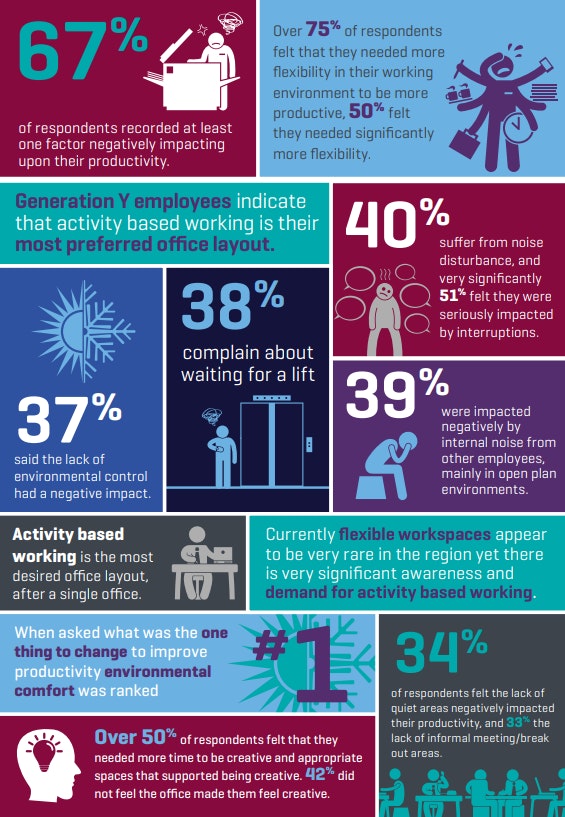Ten years on: is productivity in the Middle East any better?
A decade after a landmark study into office productivity in the Middle East, new research will explore how shifting expectations are reshaping workplace experience
Across the globe, organisations are rethinking how workplace design can better support performance, wellbeing and flexibility. In the Middle East, where rapid urban development meets shifting employee expectations, the conversation around office productivity is evolving fast. Comfort, culture, and choice have emerged as key factors in shaping the daily work experience, but many of today’s office environments are still missing the mark.
A decade of change
In 2015, Professor Nick Nunnington conducted research on behalf of the Royal Institution of Chartered Surveyors (RICS) and the Middle East Council of Offices (MECO) which shook up the conversation on office design in the Middle East. It revealed just how much environmental comfort, workplace culture, and flexibility (or the lack thereof) were impacting productivity across the region.
A decade after his original landmark study, Nunnington is returning to the region to revisit key questions around productivity and explore how workplace conditions have changed.
Key insights from the 2015 study
The initial research found that while individual companies require their own unique approach to measuring productivity, there are some consistencies across the world – and some findings that are unique to the cultural makeup of the Middle East and North Africa (MENA) workforce.
In a survey of over 550 respondents in the Middle East, more than 75% of employees felt that in order to be more productive, they needed more flexibility in their working environment.
Four in ten employees said they suffer from noise disturbance, and over half (51%) reported feeling seriously impacted by interruptions. This is consistent with over 30 years of research, which validates that environmental disruption is a consistent and serious barrier to productivity for many organisations.
More than one-third (37%) of Middle East respondents said a lack of environmental control – including access to air-conditioning settings – negatively affected their productivity. Female workers in particular flagged this as a highly significant element of comfort, and one which created serious problems in being productive.
Other factors identified as adversely impacting productivity included internal noise from other employees (such as phone conversations, 39%), waiting for a lift (38%), a lack of quiet areas to focus (34%), and a lack of informal meeting and appropriate breakout areas (33%).
When asked to name a single change that would improve productivity, environmental comfort was the most common response.

Revisiting the research today
In the upcoming research, the questions delve deeper. The study will gather data from more professionals across the Middle East to understand how our workplaces have evolved and where they still fall short.
The first wave of respondents from this survey are already indicating that the landscape is changing. Key findings include:
-
- Productivity has improved, rising from 52% in 2016 to 68% in 2025.
- Environmental quality still matters most – lighting, noise, temperature, and air quality are key.
- Hybrid work is now lifestyle-driven, not just a convenience. Top reasons include work-life balance, commute reduction, and flexibility.
- Activity-based working (ABW) is gaining traction, especially for collaborative tasks done in-office, while focused individual work often happens remotely.
- Noise and distraction remain the top behavioural issue for over a decade.
- Design is still falling short, with many offices lacking quiet zones, personal control, and appropriate breakout areas.
- Emotional connection to the workplace (joy, pride, involvement) has increased, particularly among Gen Z.
The world of work – and the reasons for going to the office – has pivoted after the pandemic, with an increased focus on wellness, sustainability, and employee satisfaction and retention. The study will examine how hybrid working, more flexible workplace strategies, changes in technology and building specifications have influenced the complex picture of workplace comfort, satisfaction, and productivity.
If you work in the Middle East region, we invite you to share your experiences and participate in the research by taking the survey here.
- Nick Nunnington is an academic, consultancy practitioner and researcher involved with Corporate Real Estate (CRE) from its evolution. Co-founder and senior advisor to Workplaced, he has been engaged in the Middle East both as an academic (a former Associate Provost of the Higher Schools of Technology, UAE) and as a CRE consultant. Visiting Professor (CRE) to Nottingham Trent University, UK and Assistant Professor Neapolis University, Cyprus.
- Oliver Baxter is a renowned independent workplace consultant and public speaker in the Gulf region. With over a decade of experience, he has established himself as a leading authority on workplace design and employee engagement in the built environment.








